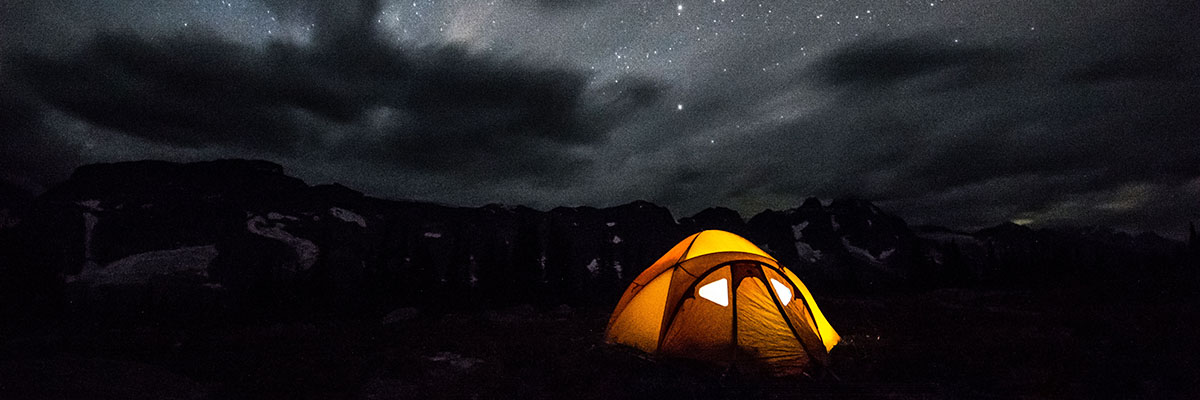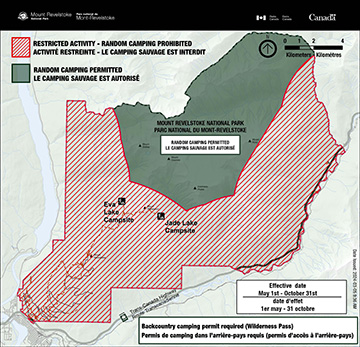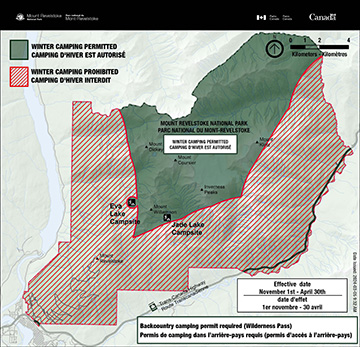
View from Eva Lake Backcountry Campground
Backcountry camping
Mount Revelstoke National Park
Please be advised that as of August 20th, 2024, the fire ban has been LIFTED for Glacier National Park. A fire ban remains in effect for Mount Revelstoke National Park until further notice.
Mount Revelstoke National Park offers two backcountry campgrounds for visitors looking to experience the rugged wilderness of the park.
Camping Reservations
Reservations for the 2025 season will launch on January 17, 2025 at 8 a.m. Pacific Time. Campsite reservations are accepted at Snowforest Campground and at Eva Lake and Jade Lakes backcountry campgrounds.
Reserve your campsite!Most requested
Campgrounds in Mount Revelstoke National Park
Eva and Jade Lakes backcountry campgrounds
There are two designated summer backcountry campgrounds in the park at Eva Lake and Jade Lakes. Each area has four reservable tent pads, a pit toilet and bear-proof food storage lockers. The trailhead is located at the summit of the Meadows in the Sky Parkway, and winds six to nine kilometres through rolling subalpine terrain and treeless alpine tundra to reach high elevation lakes.
| Eva Lake | Jade Lakes | |
|---|---|---|
| 2025 operating dates (nights) | July 1 - October 1 (snow dependent) | |
| 2025 reservable dates (nights) | July 14 - September 14 | |
| Maximum reservable nights | 3 | |
| Fees | See fees | |
| Number of sites | 4 | |
| Maximum people per site | 4 (2 recommended) | |
Campfires are not permitted. Dogs are not allowed in the upper mountain area or backcountry of Mount Revelstoke National Park, including Eva and Jade Lakes campgrounds.
Backcountry campers require:
- A backcountry camping permit. Reservations are available online or by telephone at 1-877-RESERVE (1-877-737-3783). A non-refundable reservation fee applies to all bookings. For first come, first served sites, visit the Snowforest Campground Centre the morning of your trip.
- A national park pass. Available for purchase at the Snowforest Campground Centre and the Meadows in the Sky Parkway kiosk in Mount Revelstoke or at the Parks Canada Administration Office in Revelstoke. Visit our fees page for more information.
Random Camping

Summer (May 1 to October 31)
Backcountry travelers venturing off the beaten path must be aware areas for random camping areas are limited (see maps for more information). Many areas are snow covered well into July and avalanches can happen at any time of year.
Winter (November 1 to April 30)
Winter backcountry camping is only allowed more than five kilometres from the Trans-Canada Highway and Highway 23N. Winter backcountry travelers planning to stay overnight must understand the risks of winter backcountry recreation, how to travel in avalanche terrain and how to practice self-rescue techniques. Winter campers must be aware that areas where random camping is allowed are limited in winter and are only accessible through complex avalanche terrain.
There is no winter frontcountry camping in Mount Revelstoke National Park. Sleeping in vehicles in parking areas is prohibited.
Random camping passes and permits
All park visitors require a National Park pass. For backcountry overnight use, a backcountry permit is also required and can be purchased at the Snowforest campground (summer only) or the Revelstoke Parks Canada office.
Special conditions for random camping
Location - Summer (May 1 to October 31): At least 5 km from the Trans-Canada Highway, Highway 23N or a Parks Canada roadway, 2 km from designated backcountry campgrounds, 100 m away from any trails and 50 m from any water source.
Location - Winter (November 1 to April 30): At least 5 km from the Trans-Canada Highway, Highway 23N or a Parks Canada roadway.
Dogs: Not allowed.
Fires: Wood fires of any kind are not permitted. Gas stoves only.
Party size: Maximum group size is 6 persons.
Length of stay: Two-night maximum.
No trace camping
Pack it in / pack it out. All waste including toilet paper, hygiene products and food scraps.
Human waste (summer): Dig a hole 8 to 12 inches deep away from trails and campsites and at least 70m from water sources. Loosely fill the hole with soil and rocks.
Human waste (winter): Human waste must be packed out unless an outhouse is available and accessible.
Take only pictures: Leave all rocks, fossils, antlers, wildflowers, ice and natural or historical objects as you found them for other visitors to enjoy.
Wildlife attractants
Set up cooking/eating and food storage areas at least 50 m downwind from your tent and 50m from each other.
Evaluate your destination ahead of time to determine the appropriate method of bear-resistant food storage required. Are there suitable trees to hang food and wildlife attractants with rope and a storage bag or do you need an approved bear-resistant container? You need to safely store all wildlife attractants including your food, dishes, cooking supplies, toiletries and garbage.
Wash dishes and disperse strained water in a scatter pattern on land at least 50 m from a water source and your sleeping area. Strain food particles out of dish water and store with garbage.
Random camping safety
Random camping users must be responsible for their own safety, ensuring they have the skills and experience necessary. They must be prepared for extreme weather conditions in mountainous terrain. Cell phone coverage is unavailable in most areas, an alternate means of communication is recommended. Random camping requires route finding, first aid and backpacking skills, experience and equipment.
To travel in the backcountry in winter you should:
- Understand the risks of backcountry recreation, how to travel in avalanche terrain and how to practice self-rescue techniques.
- Have an avalanche transceiver, shovel, and probe for every member of the group.
- Check today's Avalanche Bulletin to determine the current conditions.
- Carefully plan your route using online resources, maps, guidebooks and information from Parks Canada.
Plan ahead, be prepared and always let someone know where you are going and when you plan to return.
For emergency: 1-877-852-3100.
Related links
- Date modified :

